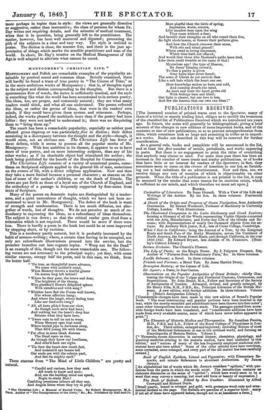MONTGOMERY'S CHRISTIAN LIFE. * MONTGOMERY and Pollok are remarkable examples of
the popularity at- tainable by poetical sound and common ideas. Strictly examined, there will hardly be found a trace of true poetry in "The Course of Time," or in the more ambitious works of Montgomery ; that is, of thoughts equal to the subject and diction corresponding to the thoughts. But there is a spontaneous flow of words, the metre is sufficiently musical, and the style is something like what the world has been accustomed to in serious poetry. The ideas, too, are proper, and commonly natural ; they are what many readers could think, and what all can understand. The poems reflected the ideas, or rather the germs of ideas, that were in the readers' own minds if they could have given them system and utterance. Perhaps, indeed, the works pleased the multitude more than if the poetry had been loftier : they were not tasked to understand it; there was no disquieting them to "bring them up." The result has been a remarkable popularity, especially as neither poet affected gross claptrap or was particularlyfine in diction ; their defect consisting in a discrepancy between the thought and the style—though, it would seem, not an obvious one. The Christian Life has fewer of these defects, while it seems to possess all the popular merits of Mr. Montgomery. With less ambition in its themes, it appears to us to have more of true poetry, and on more interesting subjects, than any of his other works; as if its charitable object had stimulated the author; the book being published for the benefit of the Hospital for Consumption.
The Christian I4fe consists of a variety of occasional poems, some- times on Scriptural subjects applied to the general life of man, sometimes on the events of life, with a direct religious application. Now and then they take a more limited because a personal character ; as stanzas on the loss of some of the author's children, or on the death of friends. The views are put forth as those of a loyal son of the Church of England, and the orthodoxy of a passage is frequently supported by foot-notes from texts of Scripture.
Many of the poems on domestic topics are distinguished by a tender- ness, and a quiet naturalness of thought, which we have not been ac- customed to meet in Mr. Montgomery. The defect of the book is want of strength and condensation. There is too much diffusion, not alto- gether of words, but of thoughts. We do not perceive so much of re- dundancy in expressing the ideas, as a redundancy of ideas themselves. The subject is run down ; so that the critical reader gets tired from a reiteration which is not required. There would be more if there were less. There is hardly a poem in the book but could be at once improved by stopping short, or by excision.
This is a tendency partly natural, but it is probably increased by the habit of sermon-writing; where, a certain time having to be occupied, not only are subordinate illustrations pressed into the service, but the preacher branches out into cognate topics. "Weep not for the Dead" is an example of this, though not the most remarkable one. The follow- ing verses are not necessary to the principal topic; yet they, with some similar stanzas, occupy half the poem, and in this case, we think, form
the better half.
"'Tis true, as thoughtful years advance, We muse with sadden'd mind,
When Memory throws a tearful glance On scenes long left behind!
"Where be they gone, the brave and dear, The brightest of the throng, Who ghidden'd Home's delighted sphere With sunshine and with song?
"Whither have fled the Forms well known, O'er whom affection hung;
And where the laugh, whose feeling tone Like our fond echo rung?
"All, all have glided from our view, As though such ne'er had been; And nothing but the heart's deep hue Retains what they have been.
" 'Twere vain to tell us not to weep, When Memory opes that tomb Where buried joys in darkness sleep, That flll'd young life with bloom.
"For often in some bleak distress The Dead upon us rise, As though they knew our loneliness, And echo'd back our sighs.
"'Tis then the heart-dew riseth fast, And moisten'd eye-beams tell Our souls are with the solemn past, And feel its mighty spell."
These stanzas from "The Mind of Little Children" are pretty and natural.
"Candid and curious, how they seek All truth to know and scan; And, ere the budding mind can speak, Begin to study Man!
Confiding sweetness colours all they say, And Angels listen when they try to pray.
* The Christian Life ; a Manual of Sacred Verse. By Robert Montgomery, MA. Oxon. Author of The Omnipresence of the Deity," Ste., Ste. Published by Hall and Co. More playful than the birds of spring, Ingenuous, warm, sincere, Like meadow-bees upon the wing They roam without a fear;
And breathe their thoughts on all who round them live,
As light sheds beams, or flowers their perfume give.
And how the Church o'erawes their sense, With rite and ritual graced! Whose creed is loving innocence, Which time bath not effaced;
And would that those who Manhood's paths have trod,
Like them could tremble at the name of God!
Mysterious age I the type of Heaven, By Jesus' blessing crown'd, To thee a purity is given Gray hairs have never found;
The arms of Christ do yet encircle thee Like a soft halo which the heart can see.
Mere knowledge makes us keen and cold, And cunning dwarfs the mind, As more and more the heart grows old With feelings base and blind; Our light is clearer, but our love is less, And few the bosoms that our own can bless !"






























 Previous page
Previous page